Layali al-Tarab fi Quds al-Arab 2015
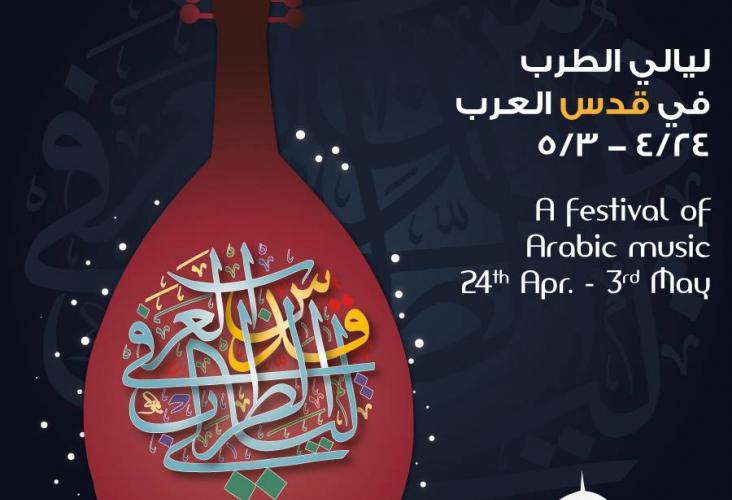
The ESNCM organizes an annual month-long Arabic music festival called Layali al-Tarab fi Quds al-Arab (Nights of Tarab in Arab Jerusalem). It is a celebration of Arabic music performances by professional Palestinian musicians, guest artists, and teachers and students from the ESNCM.
The Layali al-Tarab festival was established in 2009 and it is main focus is on strengthening the music appreciation of Arabic and Oriental music, with particular emphasis on the Tarab genre and classical Arabic singing. The festival centers on Jerusalem, but has also included performances around Palestine. Performers have included Aicha Redouane, Dalal Abu Amneh, and Simon Shaheen with the Jerusalem Arabic Music Ensemble, as well as advanced ESNCM student ensembles such as Turath and Maqamat.

Jerusalem | 24/04/2015 - 19:30 | Jerusalem Center for Near Eastern Studies (The Mormons), Mount of Olives |
Nazareth | 25/04/2015 - 20:30 | Cinemana |
Ramallah | 26/04/2015 - 19:00 | ESNCM hall, Tunis St |
Ahmad Al Khatib
Ahmad Al Khatib is an oud player and composer, currently resident in Sweden, where he teaches at the World music and Jazz department at the University of Gothenburg. He learned oud since childhood, then completed his Bachelor’s degree in musicology and classical western cello at Al-Yarmouk University (Jordan), winning the first prize of the solo performance competition in 1990 and 1991. After graduating with honors in 1997, he settled in Ramallah (Palestine). He joined the Edward Said National Conservatory of Music, teaching in the Arabic Music Department and later heading it. In 1999, he established Karloma, a music ensemble that gathered teachers from the ESNCM, including Youssef Hbeisch. In April 2002, during the siege and curfew imposed on numerous Palestinian localities by the Israeli army, Al Khatib composed the pieces for his debut solo album, Sada. The same year, the visa allowing him to live in Palestine was not renewed. Forced to leave, he continues to work for the Conservatory, building connections with various institutions in the Arab world. Since 2004 he has lived in Sweden, where he obtained a Master's degree in Ethnomusicology and Methodology of Musical Education. He has released a number of albums, including “Sada” (solo oud), “Sabil” (Oud and Percussion duo with Youssef Hbeisch) and “Jadayel” (Duo Sabil with the Bela String Quartet).
Suhail Khoury
Suhail Khoury is a leading musician in the current musical scene in Palestine. A composer, Ney and Clarinet player, Khoury has been instrumental in the overall development of the musical life of Palestine during the last three decades. Mr. Khoury played a major role in the establishment of several leading cultural organizations in Palestine including the National Conservatory of Music, Yabous Productions, the Popular Arts Center, and the Network of Palestinian Arts Centers. He also established the Palestine International Festival for Music and Dance, the Jerusalem Festival, Layali al-Tarab festival for Arabic music, and the Jasmine Festival for classical, world and jazz music. From 2005-2009 Khoury was elected president of the Forum of Arab Conservatories of Music. He has also assumed roles in the past including advisor to the Palestinian Minister of Culture and the Bethlehem 2000 project as well as artistic director of El Funoun popular dance troupe. Khoury’s discography includes: “Marah” (1987), “Marj Ben Amer” (1989), “Ashiqa” (1995), “Matar” (1998), “Bass Shwai” (2003), “Al-Fawanees” (2009), and “Jerusalem After Midnight” (2009).
Youssef Hbeisch
Youssef has taught percussion at the Edward Said National Conservatory of Music in Ramallah, Bethlehem and Jerusalem, as well as Beit al-Musiqa in Shefamer. He still supervises in this field from time to time at the two institutes, through his method book for Oriental percussion and through intensive tuition workshops for teachers and students. Youssef is a world-class musician and performs with many Arabic music ensembles as well as contemporary jazz outfits and other genres. As well as his partnership with Ahmad Al Khatib in Duo Sabil, which was formed in 2000, Youssef has been a member of Karloma since 2000 and the Oriental Music Ensemble since 2003. He has played alongside Le Trio Joubran for the last 8 years and with the Oud al-Nad group for 4 years. He has collaborated with many European artists, including the Peace Ensemble with Sister Marie Keyrouz, Herbert Dupont’s Jasmin quintet for modern jazz, and Manu Théron playing and singing music of the thirteenth century Occitan Troubadours.
Ibrahim Atari
Ibrahim Atari is a qanoun player, who began his studies at the Edward Said National Conservatory of Music in the year of its establishment, 1993. He has participated in the development of the qanoun section at the conservatory, to its position as one of the most important sections in the ESNCM today. Ibrahim has taken part in classes with some of the legendary musicians in the field of Oriental music, including Abdo Dagher, Wasid Rajab, Khalil Kardoman and Göksel Baktagir. Ibrahim has performed in many local and international festivals, as well as recording on a number of albums. Currently Ibrahim is the director of the Ramallah branch of the ESNCM, as well as teaching qanoun there.
Øystein Bru Frantzen
Øystein Bru Frantzen is a Norwegian composer, arranger, multi instrumentalist and music teacher. He currently lives in Stavanger, Norway, where he works at Stavanger Cathedral School and Stavanger School of Music and Arts. Øystein obtained his Music degree from The University of Oslo, and he is among other things a former teacher of The Edward Said National Conservatory of Music in Palestine and Dhow Countries Music Academy in Zanzibar. He has worked in a large range of different musical landscapes, including classical, jazz, rock/pop, folk music, Latin, African as well as music from the Middle East. He plays and teaches mostly bass, piano and guitar and he has also been a conductor of several choirs and orchestras. Øystein is also a member of the musical group Karloma which was founded in Palestine.
Wasim Qassis
A musician and composer, Wasim has been on the faculty of the Edward Said National Conservatory of Music since 2011 as a buzuq and percussion teacher. He leads the ESNCM ensemble “Anat”. He has composed music for film, television and theater, and has performed in tours around the world.
Rand Khoury
Rand Khoury is an exceptional cello student at the Edward Said National Conservatory of Music. She started playing cello at the age of five, and she is now an eighth level student at the conservatory. Rand is a member of the ESNCM Orchestra and the Palestine Youth Orchestra. She won first prize for her age category in the string section of the Palestine National Music Competition in 2012, and third prize in 2010 and 2014. She established a string trio along with two other ESNCM students, and they competed in the Manificat competition in Jerusalem, as well as winning second prize in the Palestine National Music Competition ensemble section in 2014.
Heather Bursheh
Heather Bursheh was raised in the Shetland Islands, in the North of Scotland, and grew up playing classical flute and surrounded by Shetland folk music. Her career followed an equally diverse path, from classical chamber music and solo recitals to immersion in Arabic, Turkish and other musics. Heather moved to Palestine in 1998, and since then has been on the faculty of the Edward Said National Conservatory of Music, as well as playing in several bands in the area.
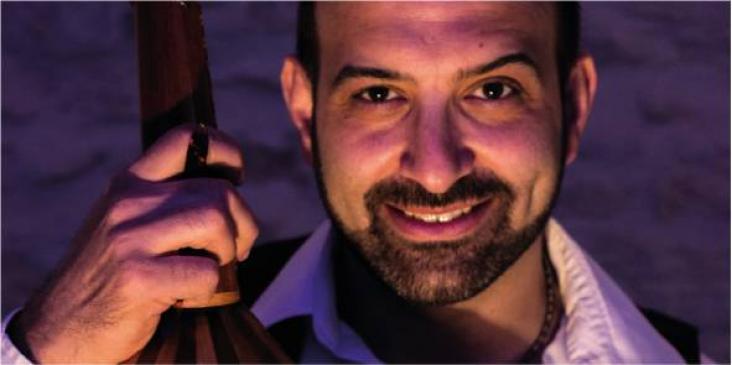
Bethlehem | 24/04/2015 - 19:00 | Dar Annadwa |
Jerusalem | 04/05/2015 - 19:30 | Garden of the ESNCM, al-Shihabi Building, Al-Zahra St. |
The singer, oudist and composer Basel Zayed will present the program “My homeland, my love”, which comprises repertoire from the Arab musical heritage.
Ramzi al-Bakri – Riqq
Eleni Mustaklem – Bass
Hiba Omari – Cello
Mohammed Ghosheh - violin
Issa Qattan - keyboard
Khalil Khoury – qanoun
Mousa Abbasi - nai
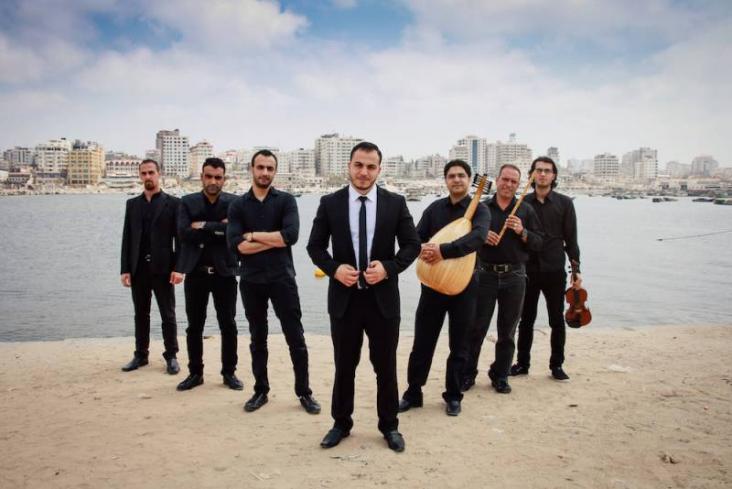
Gaza | 26/04/2015 - 18:00 | Askalan Theater - Said al-MasHal Cultural Center |
The Gaza Arabic Music Ensemble is made up of 6 faculty and staff of the Gaza Music School, who play oud, qanoun, nai, percussion, guitar and bass.
Members:
Ismail Daoud
Anas al-Najjar
Usama Jahjouh
Mohammad al-Habbash
Iyad Abu Layla
Khamis Abu Shaban
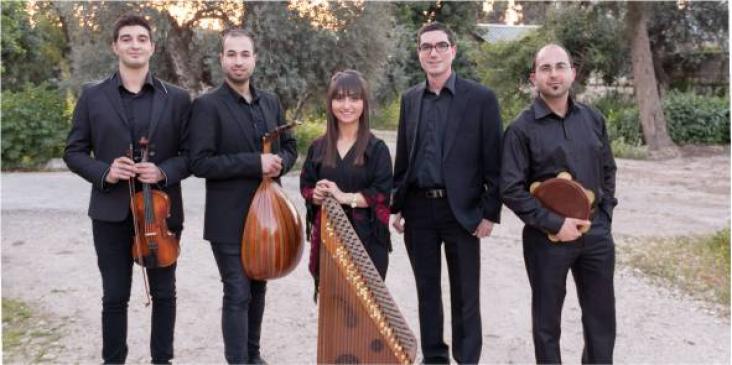
Jerusalem | 26/04/2015 - 19:30 | Garden of the ESNCM, al-Shihabi Building, Al-Zahra St. |
Mazaj is a Jerusalemite Palestinian music group, whose existence epitomizes our age, and whose repertoire is born of the womb of suffering. It envelopes the pain emanating from it in the light of renewed hope through its creative melodies, played in a Jerusalem accent.
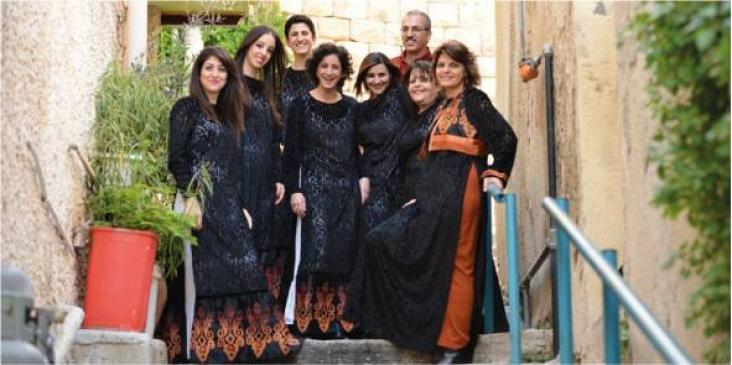
Jerusalem | 26/04/2015 - 19:30 | Garden of the ESNCM, al-Shihabi Building, Al-Zahra St. |
Since its formation, the Ud al-Nad choir has performed in all the colors of authentic Arab singing, Islamic songs including Sufi repertoire, and Christian hymns including Byzantine chants.
Members of Ud al-Nad, conducted by Katie Jarjoura:
Samih Al-Sheikh Suleiman
Ghada Boulos
Muna Bawardi
Hanine Zoabi
Christine Deeb
Georgette Gharib
Najwan Mabsaleh
Wala Jadoun
Abeer Nassar.
Members of the al-Farabi ensemble, led by Sami Khsheiboun:
Sami Khsheiboun – violin
Jamil Mansour - oud
Issa Awwad – qanoun
Aziz Nadaf - Riqq.
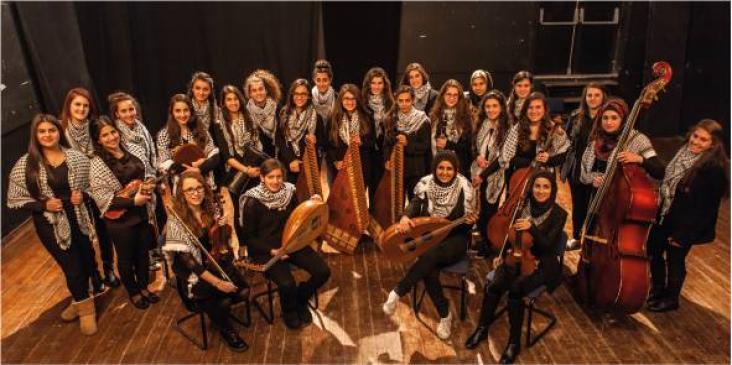
Jerusalem | 30/04/2015 - 19:30 | Garden of the ESNCM, al-Shihabi Building, Al-Zahra St. |
Banat al-Quds is an all-female Arabic music ensemble and choir, based in Jerusalem and founded in 2013.
Members of Banat al-Quds:
Afnan Abbasi – violin
Alma Abu Leil – vocals
Amira Imam – clarinet
Intisar Abu Shalbaiyah – oud
Rama Badarinah – qanoun
Rand Khoury – cello & vocals
Rahaf Madhiyeh – qanoun
Reem Obeidi – qanoun
Zeina Barakat – vocals
Sara Mshasha – vocals
Suha Abu Aker – vocals
Salma al-Abassi – oud
Suheed al-Azzeh – vocals
Shaden Makkawi – vocals
Aida Qanbar – vocals
Areen Abu Swei – vocals
Katerina Nahhas – violin and vocals
Lina Kamal – flute and vocals
Margo Musleh – vocals
Majdal Hindi – viola
Mariam Afifi – bass
May al-Khatib – percussion
Noor Alawi – vocals
Noor Fahham – vocals
Haifa’ Mitweli – vocals
Yara Qasim – vocals
Yasmine Abu Shalbaiyah – percussion.
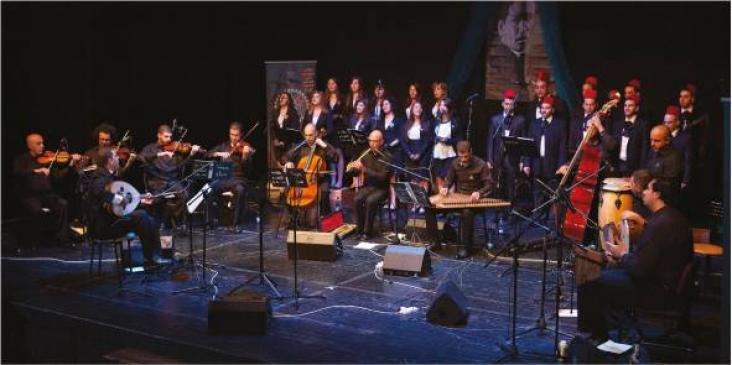
Jerusalem | 30/04/2015 - 19:30 | Garden of the ESNCM, al-Shihabi Building, Al-Zahra St. |
The Siraj Choir was founded in 2005 in al-Rameh, under the auspices of the Siraj Association, as part of its cultural, social and educational activities.
Training and musical arrangements: Samer Bishara.
Siraj Choir:
Wuroud Jubran
Balsam Darwish
Paulina Qassis
Safa Qasem
Maria Mansour
Qamar Abu Saleh
Alaa’ Bishara
Rami Ibrahim
Talat Sbeit
Salah Ershaid
Luay Srouji
Noor Darwish
The Musicians:
Yousef Makhoul – violin
Srour Saliba – violin
Charlie Safieh - violin
Ali Bakri – violin
Adel Joubran – cello
Usama Bishara – qanoun
Alaa’ Bishara – oud
Nour Darwish – buzuq
Adham Darwish – bass
Remon Dho – keyboard & accordion
Robert Ayoub – nai
Fadi Hanna - percussion
Elias Habib - percussion
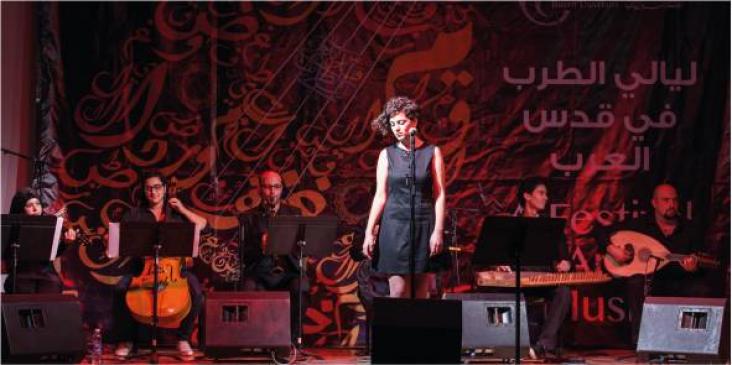
Ramallah | 30/04/2015 - 19:00 | ESNCM hall, Tunis St. |
Founded in 2006 by teachers of the Ramallah branch of the Edward Said National Conservatory of Music, Turath ('Heritage') is an ensemble of teachers and advanced students who perform Arabic classical music. In this concert they will present a program of songs from the Arab golden age.
Turath:
Hiba Omari – Cello
Eleni Mustaklem – Bass
Ashraf Affouri – Nai
Khalil Khoury – Qanoun
George Ghattas - Buzuq
Johnny Dahu – Oud
Ibrahim Najem – Oud
Hussain Abu Rab – Percussion.
Awj Choir:
Mira Abu Hilal
Salwa Jaradat
Ibtisam Ahmad
Fairuz Abu al-Teen
Mohammad Mustafa
Mohammad al-Helow
Rudi Rabi
Mahmoud Awad
Ahmad Miziro

Gaza | 30/04/2015 - 18:00 | Askalan Theater - Said al-MasHal Cultural Center |
Nisan is an Arabic music ensemble which was established with the support of the Tamer Institute for Community Education.
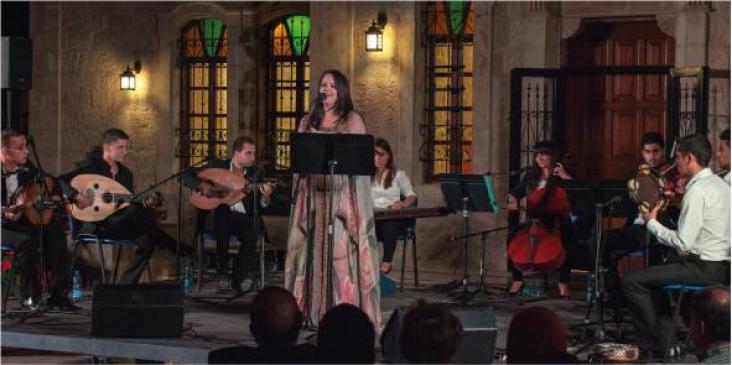
Jerusalem | 01/05/2015 - 19:30 | Garden of the ESNCM, al-Shihabi Building, Al-Zahra St. |
Majdal Shams | 03/05/2015 - 18:00 | Beit al-Fann |
Maqamat al-Quds is an ensemble which specializes in the classical Arabic repertoire. It consists of advanced students, as well as musicians who have finished their studies at the ESNCM.
Maqamat al-Quds will present a special program of classical pieces and songs by some of the most important composers and musicians of the Golden Age of Arab music, including Mohammad Abdel Wahhab, Riyad al-Sunbati, Mohammad Qasabji, Um Kalthoum, Zakariyya Ahmad, the Rahbani Brothers, and Mohammad Fawzi.
Members:
Luay Abbasi – oud (leader)
Basel Fteiha – oud
Hiba Omari – cello
Rahaf Madhia – qanoun
Katerina Nahhas – violin
Afnan Abbasi – violin
Azzat Qupty – violin
Mohammad al-Ghoul – percussion
Maen al-Ghoul – percussion
Samira Kharroubi – vocals
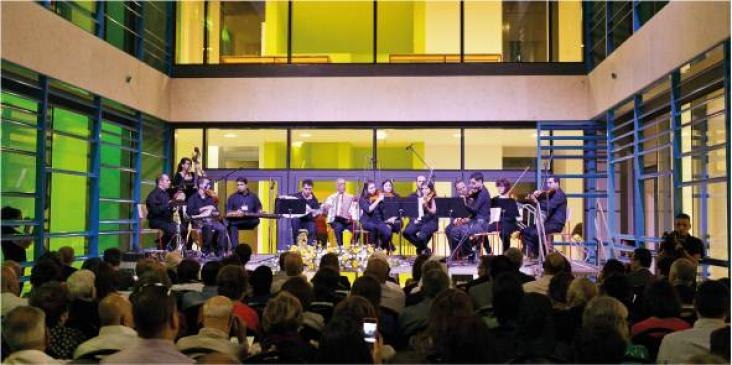
Jerusalem | 01/05/2015 - 19:30 | Garden of the ESNCM, al-Shihabi Building, Al-Zahra St. |
Ramallah | 02/05/2015 - 19:00 | ESNCM hall, Tunis St. |
The Bethlehem Arabic Music Ensemble was founded in 2008, comprising teachers and exceptional students of the Bethlehem branch of the Edward Said National Conservatory of Music.
Members:
Tamer Sahouri – oud,
Jaber Jubran – qanoun,
Wasim Qassis – percussion
Fadi Abu Eita – percussion
Rani Rishmawi – violin
Lamar Elias – violin
Carol Ibrahim – violin
Hussam Saed – cello
Hala Jaber – flute
Amira Ishaq – clarinet
Vito Galante – bass
Dia Rishmawi – accordion (leader)
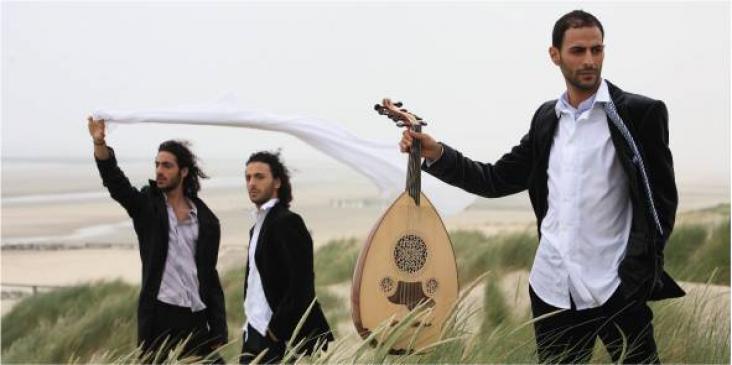
Jerusalem | 02/05/2015 - 19:30 | Garden of the ESNCM, al-Shihabi Building, Al-Zahra St. |
Samir Joubran
The Joubran family adventure began with Samir, an innovative soloist. Their first album, Taqaseem, came out in 1996, followed by Sou'fahm in 2001. His first album under the Daqui label (the label of the Atypical Nights in Langon), Tamaas, appeared in 2002. His run of performances in European and Middle Eastern venues began. He was also the first musician to be awarded, in 2003-2004, a two-year scholarship to Italy through the Writer's Asylum Program which is organized by the International Parliament of Writers.
His musical virtuosity received universal acclaim, and he was quickly invited to play with numerous other artists, in particular with great poets of the likes of Mahmoud Darwish. Music allies itself with the spoken word to bring to life poetry where melancholy and passion are inextricably mixed.
Samir Joubran's musical talent was acknowledged by the movie world when he composed the original sound track for Rashir Masharawi's Ticket to Jerusalem. He was then contacted by director François Dupeyron. Three tracks from the album Tamaas are included in the sound track of Inguélézi. Three titles from Randana were used in Parvez Sharmas' documentary A jihad for love.
After Randana, the first album to bring together all three Joubran brothers, Majâz, was released in 2007, and three more albums followed. With Palestine beating in his heart, driven by his desire to give voice to his oud, Samir Joubran travels the world with his brothers.
"We have two battles to fight. The first is for our career, and the other is for peace in Palestine, and the end of the occupation."
Adnan Joubran
Adnan was born in the Galilee, in Nazareth, in 1985. The life story of the youngest of the brothers is unique. Since childhood, he had wanted to become a percussionist. Yet, he would soon hearken to the oud's call. His desire to play it became stronger at the age of fifteen. For two years, alone and with the help of his older brothers, Adnan learned to play this instrument. Immediately upon coming home from school, he would pick up Wissam's oud and, playing Samir's melodies, send his fingers flying along the trail left by his brother. Hatem, their father, encouraged him to take part in oud playing contests, and he was one of the five winners of a contest held in Palestine. The first audience Adnan would play to were his father's clients.
Returning from a tour, Samir brought up the possibility of forming a trio. This possibility became the object of Adnan's striving, and during the next year he would work with passion and discipline. It is thus that, in Paris' Luxembourg garden in August 2004, the Joubran Trio would come to life.
Alongside his brother Samir, Adnan provides musical accompaniment for the Fattoumi-Lamoureux dance company. In addition to his career within the Trio, Adnan also performs for Parisian audiences a work that combines music and the circus called EKO DU OUD (the oud's echo).
Wissam Joubran
Wissam was born in 1983, in Nazareth, in the Galilee. His father signed him up for violin lessons at the Nazareth conservatory. He became attracted to the oud after watching and listening to his brother Samir play it. He established an intimate connection with the oud, with its wholesome curves, its round belly. Seeing how he merged with the instrument, Hatem, his father, hand crafted and gave him a small oud for his ninth birthday.
Wissam started out by performing local concerts in Palestine. He then turned toward the theater, where he played the role of a singing oud player in a piece about the life of Moudaffar El Nawab. When he was twelve, he seized the opportunity to take his dreams and talent all the way to Paris' Arab World Institute, where he shared the stage with his brother Samir.
In 2002, again at his brother's side, Wissam performed musical interludes at readings of Mahmoud Darwish' poetry. Then, with the album Tamaas, Wissam's international career took off. He decided to bring his musical culture and experience fully to bear in his relationship with the oud; thus, in 2005, he was the first Arab to graduate from the prestigious Antonio Stradivari Conservatory, in Cremona. Wissam, like his father before him, continued in the line of his ancestors and became a master luthier. He builds the Joubran Trio's three ouds with his own hands, tailoring each one so that, when they are played, oud and player are one.
Master luthier, oud player, and firm believer in the symbiosis of traditional Arabic music and the modernity of the oud, Wissam Joubran is carrying his family legacy steadfastly into the future.
Youssef Hbeisch
Youssef has taught percussion at the Edward Said National Conservatory of Music in Ramallah, Bethlehem and Jerusalem, as well as Beit al-Musiqa in Shefamer. He still supervises in this field from time to time at the two institutes, through his method book for Oriental percussion and through intensive tuition workshops for teachers and students.
Youssef is a world-class musician and performs with many Arabic music ensembles as well as contemporary jazz outfits and other genres. As well as his partnership with Ahmad Al Khatib in Duo Sabil, which was formed in 2000, Youssef has been a member of Karloma since 2000 and the Oriental Music Ensemble since 2003. He has played alongside Le Trio Joubran for the last 8 years and with the Oud al-Nad group for 4 years.
He has collaborated with many European artists, including the Peace Ensemble with Sister Marie Keyrouz, Herbert Dupont’s Jasmin quintet for modern jazz, and Manu Théron playing and singing music of the thirteenth century Occitan Troubadours.
| Attachment | Size |
|---|---|
| 1.88 MB | |
| 9.61 MB | |
| 381.01 KB | |
| 572.91 KB |
